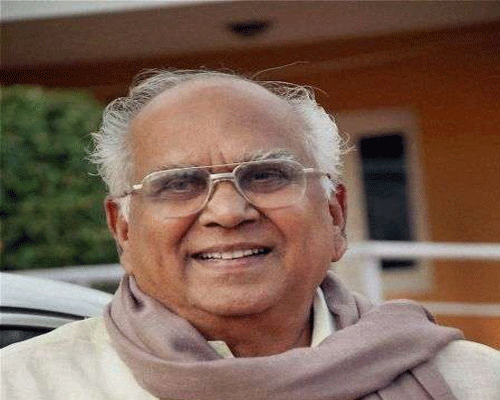
I have grown up watching Akkineni Nageswara Rao films. Again and again. But then, who in Andhra Pradesh has not? Nageswara Rao was a phenomenon who was, and will forever remain, an intrinsic part of the cultural landscape of Andhra Pradesh.
Perhaps — to some extent –– of Tamil Nadu too, where he lived and worked for decades, including in a few Tamil films, also being honoured with Tamil Nadu’s highest award for artistes — Kalaimamani.
Nageswara Rao was honoured in Karnataka too with the title Nata Saravabhowma, meaning ‘emperor among actors’. Several critics who have seen the various-language versions of the film Devadas, hold that Nageswara Rao’s portrayal of its eponymous hero, the lovelorn alcoholic, was the best. Dilip Kumar himself said that Nageswara Rao’s Devadas ranked above all the others.
Among the awards he received were Dadasaheb Phalke Award, Padma Vibhushan, Raghupathi Venkaiah Memorial Award, NTR National Award, and many others. He was conferred honorary doctorates by several universities.
Nageswara Rao was that rare combination of superstar, who enjoyed tremendous commercial success, while also being a critically-acclaimed artiste, film-entrepreneur, well-known philanthropist, and patriarch of a family with several respected film personalities. This was a rare record for an Indian thespian, especially someone from such a humble background.
Known variously as Nageswara Rao, ANR or simply Akkineni, his was an extraordinary and inspiring life. Born into a poor farmer’s family in a backward village in Andhra Pradesh’s Krishna district on September 20, 1923, ANR dropped out of school after Class 3 because his parents did not have the means to educate him further. And then he became an actor. And an icon. A lodestar in Telugu cinema.
ANR started out with theatre as a young boy, donning female roles too. He would act, sing and recite padyalu (poetic verses) with ease. Dharmapatni and Seetarama Jananam in the early 1940s were his first films with director Ghantasala Balaramaiah, who spotted his potential and gave him the first role as hero in the latter.
ANR acted in about 255 films in his seven-decade career — Telugu (mostly), Tamil (a few) and Hindi (the musical hit Suvarna Sundari). Most of his films were superhits at the box-office and also fetched appreciation for his prodigious acting talent.
All the leading southern female stars were paired with him –– yesteryears’ Savitri, Jamuna, Anjali Devi, Bhanumathi, B Saroja Devi to latter-day star Vanisri, and finally, Jayaprada and Sridevi. His versatility was legendary.
He played with equal elan a tragic lover in Devadas and Laila-Manju, and the comic roles of an enthusiastic, sometimes-cheeky, young detective in Missamma, and a boisterous youth in Preminchu Chudu. He was wildly popular as a romantic hero too –– Premnagar, Illarikam, and Premabhishekam (with an all time record of a 533-day run in Hyderabad) being examples. He performed nine roles in Navaratri.
ANR’s repertoire extended to a wide range of challenging roles from Indian epics –– Lord Vishnu in Chencu Lakshmi; a dashing, valiant Arjuna in Sri Krishnarjuna Yuddham; a wily Narada in Bhookailasam, matching wits with Ravana played by his screen-rival and other cinema colossus N T Rama Rao; and the lover-warrior Abhimanyu in Maya Bazaar. He also played a judge and lawyer in Sudigundalu, one of his career-best, though least-talked-about, performances.
ANR impressed in bhakti-rasa, as he presented a paradox –– a hardcore atheist in real life who played, memorably, the roles of great saint-devotees in his reel life. It goes to establish his greatness as an actor. Such films included Mahakavi Kshetrayya, Bhakta Tukaram, Vipranarayana, Bhakta Jayadeva, Mahakavi Kalidas, etc. In his son Nagarjuna’s film Sri Ramadasu, he played Kabir. In an industry where religious-faith and superstitions are the norm, his rationalism was unusual.
In later years, the illustrious artiste moved, with dignity, to roles of father or grandfather, to the hero/heroine with Sitaramayyagari Manavuralu (1991) being a highlight of this period. Manam, his last and yet-to-be-released film, is another illustration. ANR was an artiste till his end, which came in the form of cancer.
Known as a gentleman, he was always generous with his praise of other actors, and modest about his own achievements. He always credited the affection of the public for his success. For all his exceptional success and talent, he always remained grounded and accessible. “I am a Class 3 pass,” he would joke self-depreciatingly, especially at functions where intellectuals were present.
Asked about the secret of his fitness and energy, he would sometimes, playfully, attribute it to the “running around trees” in his commercial films, and also to his mother not weaning him till he was five.
Among his most enduring contributions were creating a base for Telugu films in Andhra Pradesh and founding the top-grade Annapurna Studios. This studio was also a part of his strategy to help relocate the Telugu film industry from Chennai, where it was based for decades. His sons, producer Akkineni Venkat and superstar Akkineni Nagarjuna, helm its management.
Talking to his fans and prominent personalities while writing this, I heard the refrain: “What words are adequate for him? No praise is enough for this cinematic giant.”